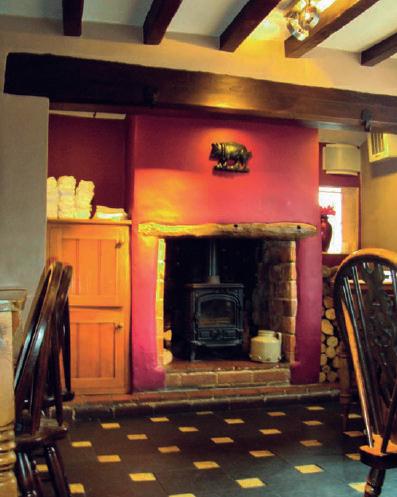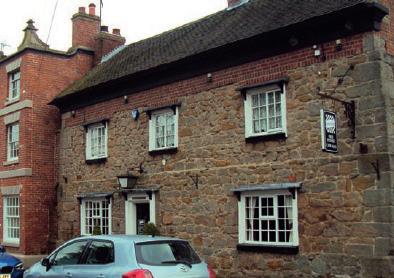
5 minute read
John Thompson Led County’s Brewing Revival
John Thompson Led County’s Brewing Revival
There are upwards of sixty breweries today, so it hardly seems plausible that for much of the 1970s Derbyshire was bereft of commercial brewing.
Advertisement
The last coppers to be fired were in brew pubs – the Exeter Arms, Derby and the Nags Head above Belper
Market Place, circa 1970. All this changed, however, when John
Thompson (pictured) launched JTS
XXX to celebrate the Queen’s Silver
Jubilee at his eponymous pub in Ingleby over the Whitsuntide weekend of 1977.
John was a market gardener who sold his wares on Derby’s Morledge market and, ever the entrepreneur, the converted ground floor of his 15thC farmhouse home was granted an on-licence in 1969. Also pictured is John’s wife, Ann, who inspired a continental style, bottom fermented Lager named after her, and this, too, was brewed in an outbuilding on the site. It was, therefore, apt that John should be invited to open the inaugural Derby City Charter Beer Festival in April 1978 and the fruity, full bodied, medium strength bitter went down well with the King’s Hall punters. A couple of years later, city dwellers were able to sample the tasty brew at Saddlers, Sadler Gate. Today, John is 91 years old and still active, whilst his son, Nick, runs the country inn and John Thompson
beers are still brewed here.
Extensive gardens allow plenty of room for children to roam and there are some chalet style self-catering lodges for vacations. Inside the pub there are all the accoutrements one would expect from a building of this age, so beware of the low beamed ceiling! There’s a splendid side room and a tiny snug with illustrations of many Nottingham pubs. A family atmosphere prevails and children are most welcome in the large conservatory. The culinary offering includes hot plate specialities. There are, of course, other pubs in this part of south Derbyshire worth seeking out and we’ll start on the High Street in the charming old village of Ticknall, close to the National Trust property, Calke Abbey. The Wheel had a brace of real ales on when I called in on a Saturday and the front bar has been opened out in contemporary style with log and coke burning stoves radiating warmth in winter. Outside, to the rear, is a well-tended, multi-level, decked garden which can be accessed via patio doors from the L shaped bar.

Around the corner, on Ashby Road, is the grade 2 listed Staff of Life, a tall, Georgian building once named the Loaf of Bread, and a huge baking paddle (shovel) prominently displayed attests to its former bakery. There’s a large room with extensive wainscoting and beamed ceiling but it was the smaller, dog

friendly room (pictured) which really caught my attention. This featured a high-backed settle and a striking, quarry tiled floor laid by the owner, Christopher Nix. On the bar is a constantly changing quartet of real ales and those who prefer the grape to the hop are not forgotten either. An enticing looking menu included vegetarian options and a specials board. The stables have been converted to good quality accommodation, ideal for visitors to the area.

Further along Ashby Road is another grade 2 listed pub, the 17thC brick and stone built Chequers which is the most characterful of Ticknall’s pubs and of the three rooms it’s the small, main bar with cosy corners which merits most attention. Here is an inglenook fireplace with seats either side having headroom scooped out of the breast beam. The late Ted Mather served the revered Ruddles

County here in the days when it was frequently cloudy and always excellent, before Watney’s takeover of the Rutland brewery in 1986 imbued mediocrity. Today, Doom Bar and a nice drop of Draught Bass are served. A couple of miles away in Milton, is the homely, Good Beer Guide listed Swan on Main Street, run by Kevin and Tracey Richards along with partners Shaun Richards and Rio Memmory who have been busy restoring this old village Inn. They are keen to use local micro-brewery ales and have a great range on the pumps all the time. This is a friendly local inn that’s well worth a visit as Kevin and Tracey are experienced pub operators. My last port of call was the unmissable Crewe and Harpur next to the 13th century Swarkestone Bridge and causeway, over the River Trent, which has twice been the focus of pivotal historic events. Firstly, in the Civil War (1643), this important crossing place was unsuccessfully defended by the Royalists against the Parliamentarians. A century later, in 1745, Bonnie Prince Charlie turned back to Culloden on hearing that the English Army was advancing. There’s been an


inn here for 800 years and the present Georgian pub was built as a coaching inn on the estate of the Harpur-Crewe family whose seat was Calke Abbey. The pub’s vast, contemporary interior is split into distinct areas, one of which is a children’s play centre; inclusivity is the theme here with drinking and eating in a family friendly environment. Adults may choose from various beers which come under the Marston’s umbrella, and accommodation is available. Across the side road is a grassed garden area leading down to the water’s edge which is bound to be busy in summer. Pleasingly, in the past forty years, this rural district has bucked the trend of pub closures, apart from losing the Sir Francis Burdett and the Saracen’s Head at Heath End, on the Derbyshire border with Leicestershire, near Calke Abbey. The gabled pub with a long driveway was purchased by the Harpur Crewe family in the 1950s, and served jugged Draught Bass, but sadly closed around 2000.



